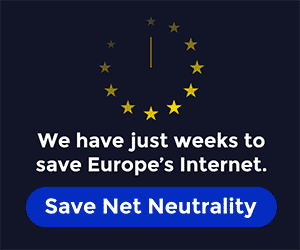Telecom industry poised to win big with EU ‘net neutrality’ rules that let them prioritize services of their choosing and throttle VPN and torrent traffic.

After being besieged by telecom lobbyists, the European Union’s
communications regulatory body, BEREC, has issued “net neutrality”
guidelines that let ISPs prioritize certain services and throttle whole
classes of traffic, like VPNs, BitTorrent, or videochat. The proposal is
in a final public comment period that ends on July 18.
Under the
proposal, ISPs are instructed to discriminate against classes of traffic
when managing their networks. The rules appear to be designed to
prevent commercial considerations when deciding what to throttle—and
that’s a good thing—but the wording of the regulation could lead to
forms of discrimination that are even more far reaching. For example,
peer-to-peer traffic could be throttled before traffic from streaming
video services, even if the peer-to-peer service is in fact using less
bandwidth. VPN traffic could be throttled simply because ISPs wouldn’t
be able to determine what category it is.
And this mass throttling
could be done as a standard operating procedure, not just for times
when there is excessive congestion on a network. Under the rules, ISPs
can engage in class-based throttling whenever they believe congestion is
“impending,” which, if you consider the chaotic nature of the Internet,
could really be whenever.
Another major loophole in the rules is
the ability for ISPs to engage in zero rating, a practice that has been
around in Europe for a while and is a big part of why online innovation
has been sluggish there. Under zero rating, ISPs exempt their own apps
and services, and those of their partners, from monthly data caps. These
arrangements incentivize ISPs to reduce data allowances (EU ISPs that
engage in zero rating give, on average, 50% less data each month for the same price) and they give ISPs more control over what we do online.
These
loopholes allow ISPs to violate net neutrality’s basic principles, and
they will ensure that Europe’s Internet continues to lag behind the rest
of the developed world. Innovation will stall under the uncertainties
created by these provisions, and freedom of expression will be limited
as ISPs cement their gatekeeper status on the Internet in the EU. Europe
is the world’s largest economy. What happens to the Internet in Europe
profoundly affects Internet freedom around the world.
It doesn’t have to be this way.
So
far, lobbyists for ISPs have been the dominant voices in shaping these
rules. Europe’s biggest telecom companies, like Deutsche Telekom,
Orange, and Vodafone, lobbied hard to get the EU Parliament to punt many
of the most important decisions to BEREC, an unaccountable regulatory
bureaucracy. The loophole-filled guidelines that BEREC released make it
clear that the lobbyists were successful. They got more out of BEREC
than they ever would have been able to get if these decisions were made
in the original legislation.
Now it’s our turn. BEREC has opened a
comment period to hear from the public before they give their final
approval. This comment period only stays open for a matter of weeks, so
if you want your voice heard you need to act quick. You do not have to
live in the European Union to take action.
This is our chance to
let them know we want strong net neutrality rules. If enough of us speak
up, we can beat the lobbyists and get these loopholes fixed. It’s how
real net neutrality was won in the United States, and it’s how India
defeated Facebook’s offensive “Free Basics” zero-rating scheme and
passed net neutrality rules instead. We can do the same in Europe, but
we have to act now.
If you run a website, blog, or Tumblr, you can be even more effective at fighting these bad net neutrality guidelines in the EU by running our banner widget on your site. Simply embed this one line of code on your page. You can customize look and feel, or the text, if you want.
For more background on the loophole in the EU’s net neutrality proposal, see these two pieces we’ve posted over at Medium:
